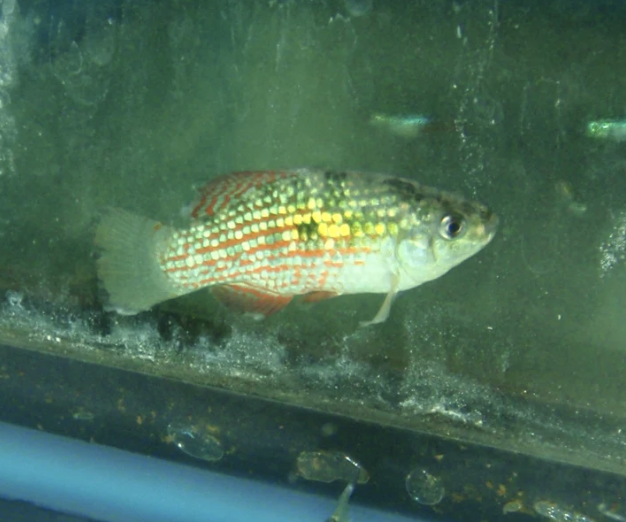 Image 1 of 1
Image 1 of 1


African Tigerfish (med)
The African tigerfish (Hydrocynus vittatus) is a fascinating and predatory fish species native to various rivers and lakes in Africa. Keeping them in captivity requires careful consideration and attention to their specific needs. Here's a general care guide for African tigerfish:
Tank Setup:
Tank Size:
Provide a spacious tank with a minimum size of at least 200 gallons for a small group of tigerfish. These fish can grow quite large, and they are active swimmers.
Water Parameters:
Maintain water temperature between 75-82°F (24-28°C).
Keep pH levels around 6.0-7.5.
Provide clean and well-oxygenated water.
Filtration:
Use a powerful filtration system to maintain good water quality.
Regular water changes are essential, at least 20-30% every two weeks.
Substrate and Decor:
Use a sandy substrate to mimic their natural environment.
Provide hiding spots and structures like rocks and driftwood.
Ensure open swimming spaces as these fish are active hunters.
Diet:
Carnivorous Diet:
Feed a diet consisting mainly of live or frozen meaty foods such as fish, shrimp, and other small vertebrates.
Offer a varied diet to ensure they receive all the necessary nutrients.
Feeding Schedule:
Feed adult tigerfish once every 2-3 days.
Younger individuals may require more frequent feedings.
Tankmates:
Aggressive Nature:
African tigerfish are aggressive and predatory. Avoid keeping them with smaller or slower fish.
Tankmates should be of a similar size and temperament.
Solitary Species:
Tigerfish are best kept as solitary or in a small group. Avoid overcrowding.
Health and Maintenance:
Observation:
Regularly observe your tigerfish for any signs of illness or distress.
Quarantine new additions before introducing them to the main tank.
Disease Prevention:
Maintain a strict quarantine procedure for new fish to prevent the introduction of diseases.
Perform routine checks for common fish diseases.
Handling:
Caution:
Use caution when handling African tigerfish as they have sharp teeth and can be aggressive.
Use a net or other suitable tools for transferring them between tanks.
Legal Considerations:
Check Regulations:
Ensure that you are compliant with local and international regulations regarding the ownership of exotic or potentially invasive species.
Note:
Always do thorough research on the specific needs of the African tigerfish and consider seeking advice from experienced aquarists or professionals before keeping them in captivity. These fish can be challenging to care for, and their aggressive nature requires a responsible and knowledgeable approach to ensure their well-being.
The African tigerfish (Hydrocynus vittatus) is a fascinating and predatory fish species native to various rivers and lakes in Africa. Keeping them in captivity requires careful consideration and attention to their specific needs. Here's a general care guide for African tigerfish:
Tank Setup:
Tank Size:
Provide a spacious tank with a minimum size of at least 200 gallons for a small group of tigerfish. These fish can grow quite large, and they are active swimmers.
Water Parameters:
Maintain water temperature between 75-82°F (24-28°C).
Keep pH levels around 6.0-7.5.
Provide clean and well-oxygenated water.
Filtration:
Use a powerful filtration system to maintain good water quality.
Regular water changes are essential, at least 20-30% every two weeks.
Substrate and Decor:
Use a sandy substrate to mimic their natural environment.
Provide hiding spots and structures like rocks and driftwood.
Ensure open swimming spaces as these fish are active hunters.
Diet:
Carnivorous Diet:
Feed a diet consisting mainly of live or frozen meaty foods such as fish, shrimp, and other small vertebrates.
Offer a varied diet to ensure they receive all the necessary nutrients.
Feeding Schedule:
Feed adult tigerfish once every 2-3 days.
Younger individuals may require more frequent feedings.
Tankmates:
Aggressive Nature:
African tigerfish are aggressive and predatory. Avoid keeping them with smaller or slower fish.
Tankmates should be of a similar size and temperament.
Solitary Species:
Tigerfish are best kept as solitary or in a small group. Avoid overcrowding.
Health and Maintenance:
Observation:
Regularly observe your tigerfish for any signs of illness or distress.
Quarantine new additions before introducing them to the main tank.
Disease Prevention:
Maintain a strict quarantine procedure for new fish to prevent the introduction of diseases.
Perform routine checks for common fish diseases.
Handling:
Caution:
Use caution when handling African tigerfish as they have sharp teeth and can be aggressive.
Use a net or other suitable tools for transferring them between tanks.
Legal Considerations:
Check Regulations:
Ensure that you are compliant with local and international regulations regarding the ownership of exotic or potentially invasive species.
Note:
Always do thorough research on the specific needs of the African tigerfish and consider seeking advice from experienced aquarists or professionals before keeping them in captivity. These fish can be challenging to care for, and their aggressive nature requires a responsible and knowledgeable approach to ensure their well-being.







